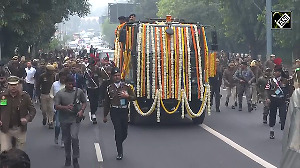Spring in New York has many magical qualities -- pristine air, clear skies and temperatures that on many days bring people out in droves to savour the city's parks and other attractions. Those qualities also spur many of India's politicians, in and out of office, to drum up visits to the Big Apple to escape the oppressive heat of New Delhi.
One of those was Jaswant Singh who had been invited to address the Asia Society. The seemingly geographically challenged talk was entitled Where is India in Asia Singh's compass, however, was unerring in its intent. After a quick review of the landscape and history of the Indian subcontinent and its neighbours, he zeroed in on a diatribe against the US invasion of Iraq and even Afghanistan!
Epitomising the knee-jerk anti-Americanism that seems to be the default option of any Indian politician out of power, he thundered about "serpents" that have wreaked more terror since the US invasion of Iraq. After gratuitous references to American dead, he declared that Iraq's current problems would eventually land on India's doorstep.
When it came to Afghanistan, Singh was far more scathing. Not only did he berate his American hosts for a lack of understanding of history and the local ethos, he ridiculed NATO's contribution to peacekeeping. While derisively referring to the fact that law making in that country was vested with Italy, a "mockery" in his opinion, Singh showed his own ignorance of history.
Italy's role as a founder of the Geneva Group of four nations and its having hosted the former Afghan king, Zahir Shah and other Afghan "intelligentsia" for decades seems to have passed him by. It was those aspects that led to Italy being the lead nation in establishing a legal framework for Afghanistan.
His most scathing comment though was reserved for the fact that President Hamid Karzai was protected by a private US security company. To him, that single fact appeared to invalidate the many benefits that not just Afghanis but India has derived from the Karzai regime. That he can now travel to Kandahar and Kabul without going on bended knees is merely a small detail.
While on Afghanistan, the Opposition leader chose to demurely highlight his role in that infamous hijacking by proudly recounting his interaction with the Taleban and the release of Indian hostages. When asked if, in hindsight, he was still of the opinion that the terrorists-passengers trade was the right decision, he bristled at the suggestion. That virtually every country that made a deal with terrorists has found it to be a slippery slope leading to more terrorism seems to have escaped him.
Whether or not the 160 passengers aboard the ill-fated Indian Airlines plane were really in danger of being killed is debatable. What is not debatable is the fact that thousands more have died as a consequence of the terrorist leaders being sprung from Indian jails. That is thanks, in no small part, to Singh's re-affirmation in New York that he was the principal Cabinet member who steered the government away from a policy of not negotiating with kidnappers. His role magnified to not only being the sole interlocutor with the kidnappers, but an oddly magnanimous voice of the Indian government given to frequent praise of the murderous Taleban government. Giving away the store to the hijackers from then on was the easy part.
Asked to speak on India's role in the larger Asian context, the leader of the Opposition frittered away an opportunity to advocate and pursue policies that are in India's interests. Criticising American foreign policy is done often both by those within and outside the country. But by adopting the old Nehruvian air of moral superiority, Singh does little either for himself or India.
Americans are less prickly about outsiders criticising them probably because they are surer of themselves. But in an analogous situation, I wonder how a domestic audience would have reacted to a Senator Harry Reid or Representative Nancy Pelosi haranguing India at the India International Centre about its providing succour to the morally reprehensible junta in Myanmar or the alacrity with which deals are being approached with the murderous mullahs of Iran.
Singh closed with an Urdu couplet to add gravitas to his comments. There is nothing wrong with Urdu or its many mellifluous couplets but for far too long, Indian leaders, particularly from the north with roots across the western border, have used that language to connote a sense of culture and learning. They should instead take a lesson from the equally sage sayings of Confucius that did nothing for China till they radically changed their approach to the outside world and trade. India needs engagement with and not hostility to outsiders. Sadly, Singh and his generation are incapable of meeting that need.






 © 2024 Rediff.com -
© 2024 Rediff.com -